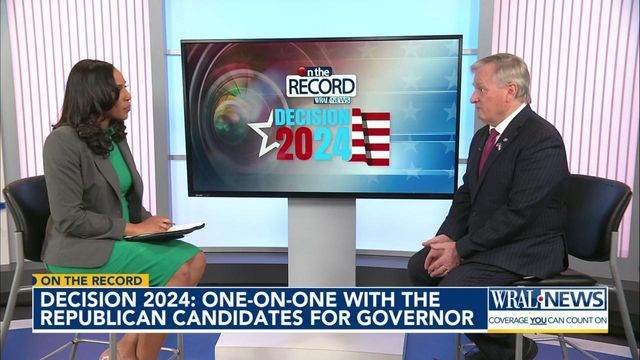North Carolina's gubernatorial candidates spar -- but not head-to-head
When early voting begins in North Carolina Thursday, voters will make a choice for governor — but without having seen the candidates side-by-side on a debate stage.
While the race for the open seat is expected to be one of the most competitive in the nation, the state’s March 5 primaries will likely come and go without any face-to-face squabbling.
In the Democratic primary, Attorney General Josh Stein and former state Supreme Court Justice Mike Morgan have appeared at events together. But no debates have been scheduled. Meanwhile, on the GOP side, front-runner Lt. Gov. Mark Robinson has ruled out sharing the stage with primary opponents State Treasurer Dale Folwell and businessman Bill Graham in their quest to fill the seat of Democratic Gov. Roy Cooper, who can’t run again after his second term runs out at the end of the calendar year.
Robinson’s unwillingness to debate is particularly notable because he has become known for his fiery rhetoric. And his commanding speaking style has been seen as a key asset and drawn praise from national political figures, including former President Donald Trump.
Folwell took Robinson to task for that decision during an appearance on WRAL’s “On the Record” program, which featured both Folwell and Graham. Robinson didn’t respond to multiple invitations to appear on the program.
Folwell said Robinson “refuses to show up for any job interview with your station or anywhere across North Carolina.”
WRAL reached out to Robinson’s campaign about comments made on the show. A campaign spokesman said Robinson had nothing to add beyond the comments he made in December, when he suggested that a debate would benefit his opponents.
“I'm not going to allow those guys to use me to get a stage,” Robinson said at the time.
David McLennan, a political science professor at Meredith College, said he’s not surprised Robinson is avoiding the stage with his opponents. It’s become a trend among frontrunners. “It’s a safe strategy for someone who’s got a lead in the polls,” McLennan said on “On the Record.”
About 34% of likely voters said they’d vote for Robinson in the upcoming primary, according to a recent Meredith poll. Nine percent favored Graham, and 4% supported Folwell. The remainder said they were undecided or that they’d vote for “someone else.”
Robinson has been known to confront critics head-on. In 2021, Robinson tracked down a Democratic legislator who on the state Senate floor condemned comments Robinson had made against the LGBTQ community — statements that have caused some in his own party to question his electability in the general election.
Robinson caught up with her in the hallway of the legislature and said: "Next time, before you get ready to say something on that floor, come see me.”
Robinson has mostly avoided in-person confrontations with Folwell and Graham, instead addressing critics in speeches at events or through the media.
In 2022, then-U.S. Rep. Ted Budd faced criticism for declining to debate his opponents in the Republican primary for U.S. Senate. Budd led in primary polls and went on to win easily.
Former President Donald Trump is using the same strategy in the Republican presidential primary. Trump has missed five GOP primary debates so far, skipping them voluntarily or failing to qualify because he refused to sign a pledge to support the eventual Republican nominee.
Instead, Trump is hoping to spar with President Joe Biden. The Commission on Presidential Debates, a nonpartisan group, has scheduled debates between the Republican and Democratic presidential nominees for Sept. 16, Oct. 1 and Oct. 9.
But Monday, Trump called on Biden to debate him “immediately.” Asked about Trump’s comments, Biden told reporters in Nevada, “ ‘Immediately’? Well, if I were him, I’d want to debate me, too. He’s got nothing else to do.”
Once election season hits a fever pitch this fall, McLennan said voters may not be as forgiving of candidates who skip debates. In North Carolina, undecided voters may want to hear Robinson explain some of his more controversial comments on women and the LGBTQ community, McLennan said.
“He can’t avoid the tough questions,” McLennan said. “And I think when the attention gets placed on him more significantly in the general election, he may have to answer for some of his previous statements or policy decisions.”













